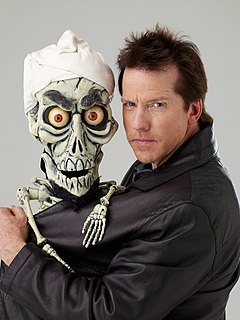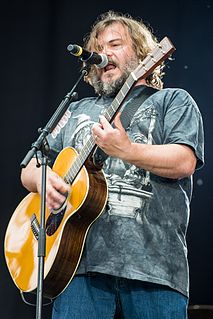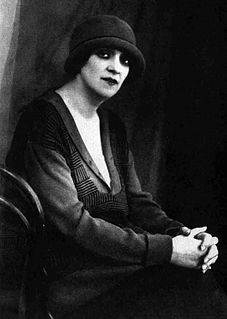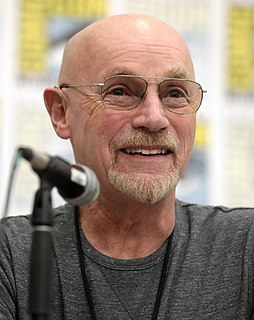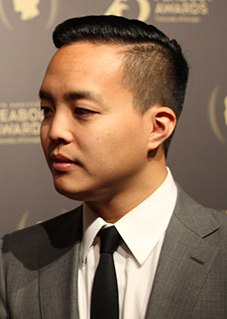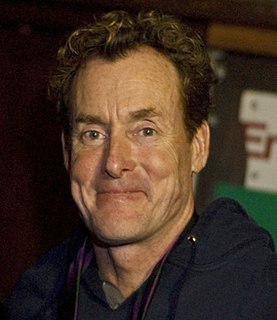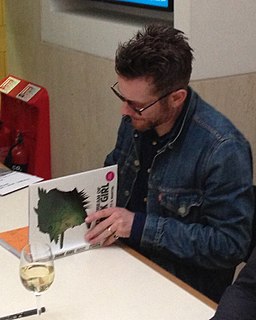A Quote by Jeff Dunham
Every character I've had in my act - none of them have a similar creation story. I actually thought up Peanut and designed him in my head. I described him to a woman that was making soft puppets and she drew up some sketches. And the character came to be just because he popped into my head.
Related Quotes
There have been times I thought that when I got a certain point in the story, a certain character was going to do a certain thing, only to get to that point and have the character make clear that he or she doesn't want to do that at all. That long phone conversation I thought the character was going to have? He hangs up the phone before the other person answers, and twenty pages of dialog I had half written in my head go out the window.
And then she frowned, and shook her head, then put her arms around him once more, pressing her face into his shoulder, making a noise that sounded almost like rage. 'What's up?' he asked. 'Nothing. Oh, nothing. Just...' She looked up at him. 'I thought I'd finally got rid of you.' 'I don't think you can.' he said
Billy covered his head with his blanket. He always covered his head when his mother came to see him in the mental ward - always got much sicker until she went away. It wasn’t that she was ugly, or had bad breath or a bad personality. She was a perfectly nice, standard-issue, brown-haired, white woman with a high school education. She upset Billy simply by being his mother. She made him feel embarrassed and ungrateful and weak because she had gone through so much trouble to give him life, and to keep that life going, and Billy didn’t really like life at all.
I just had a son and had to take him to the paediatrician and he measured his head and apparently he's in a group in which only 14 per cent of the population have a bigger head than him. Then she said: "Do you mind if I measure your head?" I said: "Go ahead." And she was shocked, because less than one per cent of the world's population has a bigger head than mine. So I guess that means I'm pretty full of myself. Or that I have a huge brain.
But nearly every woman I know has a roughly similar story - in fact, dozens of them: stories about being obsessed with a celebrity, work colleague or someone they vaguely knew for years; living in a parallel world in their head; conjuring up endless plots and scenarios for this thing that never actually happened.
Did you ever see the way the clouds love a mountain? They circle all around it; sometimes you can't even see the mountain for the clouds. But you know what? ... The clouds never cover the head. His head pokes through, because the clouds let him; they don't wrap him up. They let him keep his head high, free.
Roger Casement is an intriguing figure - humanitarian, Irish revolutionary, gay - and much had and would be written about him, there was something about his character as a conflicted man, an Irish Protestant who spent much of his time representing England in different African nations, a gay man who, true to the times, kept his sexual orientation to himself, that kept playing in my head. I read on and around him, but a historical figure is not a story - it's not even a character - so my story, the one that I would develop into Valiant Gentlemen, had yet to reveal itself.
I did feel Dr. Cox, the character that I was auditioning for, was too similar to the head of the hospital. He was too arrogant and mean. I approached him kind of like I had a miniature Max sitting on my shoulder. I pictured Max saying, "This guy has got to give love every once in a while. He has to!" I knew there had to be tiny little windows of redemption.
Everybody thinks that 2-D is Damon, but none of the characters are based on any of us. 2-D is the classic stupid pretty boy singer. He's the fall guy, the stooge. Everyone takes the piss out of him. He had a car accident where he went through the windscreen and ended up with two bumps on his head. It knocked some cool into him
There are more similarities than differences when it comes to preparation of a performance. You're using some lyrics, you have a relationship with them, they apply to different parts of your life and different circumstances, different memories, different stories you have in your head. You form personal relationships with the song. I think that's very similar, in a way, to prepping a character. You pour your own personality, in a sense, into the character, you sympathize with a character in a way that's similar to the way you might sympathize with a song.
